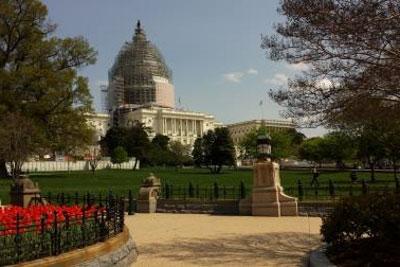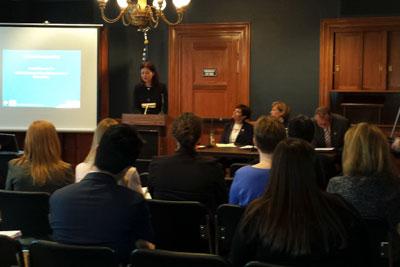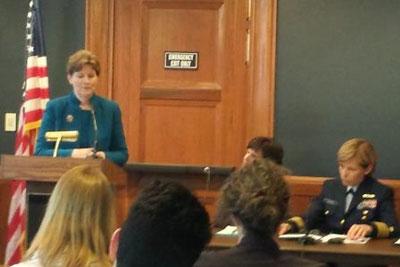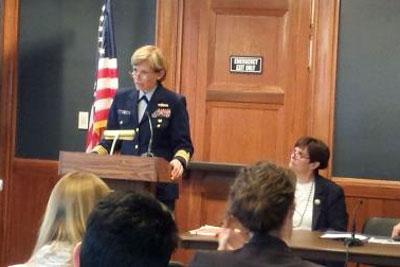Tuesday, April 21, 2015
Washington, DC
A resource page for topics covered in the Senate Forum. (no particular order)
Overview/Invitation
Senate Forum Presentation, Nancy E. Kinner, PhD




University of New Hampshire, Center for Spills in the Environment, Oil Spill Response: 25 Years After the Exxon Valdez and in the Wake of Deepwater Horizon, What Have We Learned and What Are We Missing?
When the Exxon Valdez ran aground off Prince William Sound in Alaska in 1989, 11 million gallons of crude oil gushed into the sound, making it the largest oil spill in U.S. history at the time. In 2010, the explosion of Deepwater Horizon oil rig in the Gulf of Mexico held the attention of the U.S. public and politicians as a staggering 200 million gallons of crude oil continued to leak into the gulf for more than 86 days. Two environmental disasters, billions spent in cleanup and restoration, and numerous laws and regulations passed. But what have we learned — and could it happen again? Two-day forum held in October 2014 assembled nearly 40 scientific experts and industry specialists for this discussion.
Center for Spills in the Environment hosted "Oil Sands Products Forum & Working Group" in Seattle, WA
Meeting objectives: Oil sands mining and refining process;Required specifications and the chemical composition of oil sands;Potential behavior and fate of oil sands when spilled in the marine environment; Case studies of oil sands and related product spills.
Coastal Response Research Center hosts many workshops and working groups on topics such as: dispersant use, environmental disaster data management, natural resource damage assessment and Arctic oil spill response.
List of workshops
National Oceanic and Atmospheric Administration (NOAA), Office of Response and Restoration (ORR)
Our mission is to provide science-based solutions through collaborative partnerships to address evolving economic, environmental, and social pressures on our ocean and coasts.
Interagency Coordinating Committee on Oil Pollution Research (ICCOPR)
ICCOPR is a 15-member Interagency Committee established by Title VII of the Oil Pollution Act of 1990 (Section 7001). ICCOPR was established to: “…coordinate a comprehensive program of oil pollution research, technology development, and demonstration among the federal agencies, in cooperation and coordination with industry, universities, research institutions, state governments, and other nations, as appropriate, and shall foster cost-effective research mechanisms, including the joint funding of the research." ICCOPR activities are documented in biennial reports to Congress.
American Petroleum Institute (API)
The American Petroleum Institute (API) is the only national trade association that represents all aspects of America’s oil and natural gas industry.
Gulf of Mexico Research Initiative (GoMRI)
The ultimate goal of the GoMRI will be to improve society’s ability to understand, respond to and mitigate the impacts of petroleum pollution and related stressors of the marine and coastal ecosystems, with an emphasis on conditions found in the Gulf of Mexico. Knowledge accrued will be applied to restoration and to improving the long-term environmental health of the Gulf of Mexico.
National Academy of Sciences(NAS) Gulf Research Program
In 2010, the Deepwater Horizon explosion and fire caused the largest offshore oil spill in U.S. history, which had significant impacts on the Gulf environment and people. As part of legal settlements with the companies involved, the federal government asked the National Academy of Sciences (NAS) to establish a new program to fund and conduct activities to enhance oil system safety, human health, and environmental resources in the Gulf of Mexico and other U.S. outer continental shelf regions that support oil and gas production.
United States Coast Guard
For over two centuries the U.S. Coast Guard has safeguarded our Nation’s maritime interests in the heartland, in the ports, at sea, and around the globe. We protect the maritime economy and the environment, we defend our maritime borders, and we save those in peril. This history has forged our character and purpose as America’s Maritime Guardian — Always Ready for all hazards and all threats.
United States Environmental Protection Agency (USEPA)
EPA researchers conduct extensive research to mitigate the effects of past and future oil spills. EPA oil spill research includes decades-long monitoring of the impacts of spilled oil. The research includes long-term effects from the 1989 Exxon Valdez incident and technical support in the Deepwater Horizon- BP Gulf of Mexico Oil Spill.
Bureau of Safety and Environmental Enforcement (BSEE)
BSEE works to promote safety, protect the environment, and conserve resources offshore through vigorous regulatory oversight and enforcement.
Bureau of Ocean and Energy Management (BOEM)
Objective: To conduct research that will improve BOEM’s estimates of oil-spill transport, fate, and impacts to the environment.Enactment of the Oil Pollution Act of 1990 has led to an increased emphasis on oil-spill research. Oil spills are one of the major areas of public concern with regard to offshore oil and natural gas development.
United States Department of Energy, Research Partnership to Secure Energy for America (RPSEA)
RPSEA’s mission is to provide a stewardship role in ensuring the focused research, development and deployment of safe and environmentally sensitive technology that can effectively deliver hydrocarbons from domestic resources to the citizens of the United States.
Science Partnerships Enabling Rapid Response (SPERR) informational one-pager